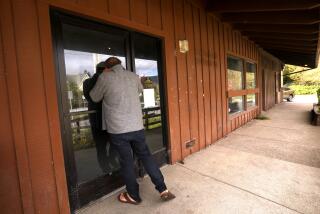Carriers’ Tenacity Is Put to Test
- Share via
WASHINGTON — Ricky Williamson ducked into a bar Monday afternoon to confirm from television what he had just heard on the street--two of his fellow postal workers had died, likely from inhaled anthrax. And with that, Williamson was transported from his innocuous route in northwest Washington to the trenches of a war, the letters in his gloved hand a potential weapon.
After 30 years of delivering mail, Williamson had never encountered anything like this.
His uniform now includes a mask to wear while sorting letters and white rubber gloves to deliver them. Not only are two workers dead, at least two others are sick. And hundreds of his comrades spent most of Monday waiting in line at a hospital to have their noses swabbed; they left clutching sheets of foil-wrapped Cipro.
Williamson works out of a post office miles from the Brentwood facility where contaminated letters were processed, but much of the mail he carries comes through there just the same. His bag empty, he peeled off his gloves and went back to his station.
“Quit? Not at the moment. I don’t see no reason to quit,” he said. “That’s what they want. They want to throw us off what’s normal. We just can’t let that happen.”
All around the Washington area, postal workers stayed on their routes in a display of dedication as bioterrorism tested their fabled dark-of-night tenacity. At D.C. General Hospital, letter carriers, clerks and supervisors arrived by the busload for testing; white delivery trucks lined the hospital’s circular driveway. Uncertainty consumed them, everything from where they should report to work to whether they would be paid for the hours spent in line to whether the feared disease would find them.
“I don’t need anyone to tell me it’s possible there could be other letters that came through,” said Ray Williams, executive vice president of the American Postal Workers Union local. He arrived at the hospital late after spending most of Monday “bombarded” with calls from worried union members.
But few answers were forthcoming as government officials reported only that anthrax was likely the cause of the two deaths. Workers complained that they were learning more from their patrons and the television news than from the U.S. Postal Service that employs them. Instructions were spare, gloves and masks the only precautions. A number to call for information was often busy.
“It’s all hush-hush,” one mail carrier said, shaking his head as he wound up his route and made his way back to his post to clock out.
The mystery began Thursday when supervisors at the Brentwood plant shut down machines in the massive sorting room to alert employees that health officials were there to test the equipment.
Word did not come until Saturday that a Brentwood worker was sick. And in briefings held at some facilities Monday morning, no mention was made that two postal employees had died.
“The postal management only cares about getting out the mail, not its employees,” Keith Beckett, 42, complained outside the hospital, antibiotics in hand.
William Johnson, a clerk at the Brentwood station, was alerted by television reports Monday that he should go to be tested. He arrived at 10 a.m. for a five-hour wait. The low point came shortly after 1 p.m. when a co-worker spread the word that two of their colleagues had died.
“That was bad. The mood was down,” said Johnson, who still had the night shift ahead of him.
Some workers worried that the Postal Service itself had become a target for bioterrorism, rather than just the conduit for it. Some workers felt their lives were valued less than those of the other targets--Congress and the high-profile news organizations whose employees were tested last week.
Carol Cunningham works next to the section at Brentwood responsible for government mail, where the contaminated letter received by Senate Majority Leader Tom Daschle was likely handled. She knew one of the men who died. “I’m very upset,” she said. “I feel we all should have been tested last week.”
Still, no one was heard talking about resignations or transfers or early retirement. The sense of duty instilled by the Postal Service--that work comes first no matter what--was clearly evident.
“You hear people talk about the weather. I always say it doesn’t matter what the weather is; I gotta go to work anyway,” letter carrier Williamson said. “The attitude just goes with the territory--do the work, do the work, do the work.”
But work ethic was only part of it. Delores Smith acknowledged on her lunch hour that she was scared. Then she got a cup of ice and went back to her window post at a station not far from the White House.
Her sentiments were probably best summed up in remarks delivered in the White House briefing room Monday by Vince Sombrotto, president of the National Assn. of Letter Carriers. He was headed to New Jersey, where at least two postal workers have developed anthrax sores on their skin.
“We will rise to the occasion because, as the president just said a few moments ago, we’re all soldiers in this world and this war. And when I visit the site in Trenton, N.J., I will pass this message along to all the letter carriers there, to say that they’re in the front lines of our war against these terrorists.
“And we’ll do our part here, as our men and women are doing it in Afghanistan.”
More to Read
Sign up for Essential California
The most important California stories and recommendations in your inbox every morning.
You may occasionally receive promotional content from the Los Angeles Times.














